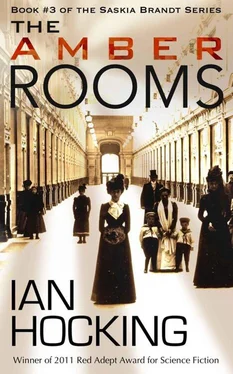Her thoughts moved to Kamo. Perhaps he had watched the house of the Count and followed her, that morning, to the Summer Palace. She shook her head at the thought because Kamo had been riding in the palace square at the moment Saskia and Pasha arrived. Kamo had been waiting, not following. He had arranged for a disguise and lost himself among the Horse Guards.
If someone in the Nakhimov house had betrayed her, how had Kamo guessed that she had hidden the spoils of the Tiflis bank robbery in the Amber Room? He had waited until they were on the threshold. Then he had attacked. His plan, as far as Saskia could work out, would have been to kill Mr Mülheim and the boy, for they were witnesses, and hold Saskia captive until the money was recovered. With the roubles located, he would improvise: take Saskia with him to Finland, perhaps for sentimental reasons, risking another betrayal; or murder her at once.
She didn’t think that Kamo could carry the money alone. Had he intended to keep Saskia alive and engage her as a helper? Perhaps he found it as difficult to kill her as she found it difficult to kill him. One night in Baku, that stinking oil town, Kamo had said he loved her.
There was another explanation. It was possible that Kamo was not alone in the Summer Palace. Perhaps another man had been waiting elsewhere. Watching.
Soso.
She could imagine him in the shadows. He would stand with one eye looking around the doorframe. He would watch Saskia and Kamo. Their fight would be no more to him than that of cocks in the pits, spurring each other to a ragged death. Yes, Saskia could imagine that shadowed man. She could even imagine his words should Saskia have killed his faithful Kamo.
‘Lynx! Leave him. Let’s run this loot into Finland. What do you say?’
~
At eight o’clock, Saskia saw a man hurry parallel to the railings that enclosed one side of the market. She tilted her head. Cartilage cracked. She held her breath and tugged out the rotting chicken. By the time the man had reached the entrance, Saskia was on her feet. She walked towards him. He backed away from her.
Robespierre had covered his mouth with a handkerchief. She pulled it away. His expression changed from disgust to hope. She kissed him once on the lips.
‘They’re the only part of me that’s clean,’ she said. ‘You could call the rest a disguise.’
His face contorted with wonder.
‘But you were bound for your far home and leaving our strange lands.’
Tears ran through the ash on her cheeks. Here she was, having failed to enter the Amber Room, covered in muck, and Robespierre was quoting Pushkin.
‘I’m not there yet. Will you still help me?’
‘With all my powers. I promised, after all.’
‘I was afraid my message got lost,’ she said. ‘I thought I’d given the urchin too much, or too little.’
‘We are both lucky. I am seldom in Petersburg these days.’
Robespierre took her arm and led her from the market. One woman called, ‘It’s buy one, get one free, your honour!’ and there was hearty laughter. Robespierre pressed the handkerchief to his face once more and moved Saskia along.
‘My carriage is outside. Are you in trouble?’
She nodded. She was thinking that a return to the Summer Palace, and its Amber Room, would be difficult indeed.
Kamo , she thought, where are you?
‘Listen,’ Robespierre said. ‘I have some identity papers on loan from a friend of a friend. I was saving them for a special occasion. A princess.’ He looked at her. As always, he was embarrassed, and a little upset with his embarrassment. ‘The friend, I mean. You may have them. There is a hotel near the Bouffes Theatre.’ He sneezed. ‘Are you hungry?’
‘Actually, I just need a boat.’
~
Two hours before the dawn, Saskia was crouched in a rowboat on the Moika. She wore her liberty corset, bloomers and canvas slippers. All were dyed black. Rain crackled on the leaves and drummed in the boat. The sounds seemed to emphasise her impatience as she waited for the top of the hour. Then she ascended the quayside stairs to a padlocked door halfway up. She pulled at the slipknots that held her ten-piece picking set to her left forearm. She defeated the lock easily.
The passage led to a stone basement. It was dark, but images came to her nonetheless: it was stacked with wine, empty fruit crates, and luggage cases. Everything smelled damp. There was a wooden door. Its pin-tumbler took her six minutes to unlock using her picking set. When the door was unlocked, she found a staircase leading to a second door.
The door opened onto Count Nakhimov’s pied-à-terre . She was standing in an octagonal dining room with a simple table and high-backed chairs. The quality of the air suggested that the room had not been opened for several days. Through a frosted window, she could see streetlight. She closed the door behind her. It was designed to close flush with the wall and, once closed, seemed to disappear. Saskia walked around the perimeter with her fingers brushing the plaster. She felt a trace of moving air on the wall opposite the door she had entered through. Sure enough, there was another door. She pressed and it swung open.
It revealed a drawing room, not quite dark, separated into two unequal parts by pillars and a half-drawn curtain. Saskia concentrated hard on processing the image that fell on her retinas. In the smaller, raised part was a bed. The room was furnished in mahogany. Holland linen hangings covered the walls. Otherwise, the room was empty.
Saskia hurried through the house. She passed the Countess’s reception room. The paintings were dark, colourless smudges. The piano lid was closed and silent. As Saskia regained her breath, she listened for footsteps in the interstices between the steady click of the grandfather clock in the hallway. Other clocks, other clicks, rattled the house. Within her, a mechanism sampled those clicks, noted their regularity, and subtracted them from her perception. Now the silence deepened. She heard a servant blackleading a stove in the basement; mice; a cat; wood contracting; water lapping; a cough; a sigh.
As she moved to leave the room, a small glow scored a line on her vision. It came from a shelf near the chimney. She took the object, a pocket watch, and touched her thumb to the Imperial Eagle on the front of the case. The reverse indicated that it was produced by Pavel Buhre, Imperial Watchmaker, for the occasion of the Countess’s birthday. Saskia opened it. The dials and hands exhibited a fierce glow. Saskia frowned at the contraption and closed it. Radioactive luminescent paint. She slipped it into her waistband.
Saskia ascended the floors, keeping to an uncarpeted third of the marble staircase. Her footsteps were soundless. She passed a descending cat. It did not stop but slowed to give her a polite blink before moving on.
~
In the corridor on the second floor, Saskia paused as a clock reached the hour: something spun inside it as a prelude to a chime, but the chime did not come. It was as though a breath had been taken and held. Slowly, Saskia turned her head. She noted a line of brass samovars; a Bible with a metal clasp; a framed map based on the Draft Of Moscovia. The shadows rolled back under her regard.
Nobody there.
She opened the door of Pasha’s room and stepped inside, closing it behind her. This room was completely dark, too. For a moment, she had difficulty seeing. Then she moved to the edge of his bed and sat on the corner.
‘Hello, Pavel Eduardovitch,’ she whispered.
‘Hello, Ms Tucholsky,’ he replied. The words were precise, even rehearsed. In Saskia’s heightened vision, his eyes were black crescents in a milky face. He was sitting up against pillows and his fingers were laced. The thread of his initials, PAB, sparkled on the breast pocket of his pyjamas. ‘Thank you for saving my life.’
Читать дальше












